|
Limitar tu búsqueda
[+–] Compilador o editor
- Abrantes Pêgo, Raquel (2)
- Aguilera, Nelly (6)
- Anguiano Cárdenas, Rosa del Cármen (1)
- Castaleda Zainos, Marcos (1)
- Del Valle Muñoz, Alejandro (1)
- Durán, Luis (4)
- García Castelán, Alfonso (1)
- Garro, Nora (1)
- Giles Valdés, Rafael (1)
- González Rojas, Bertha Alicia (1)
- Hernández Sánchez, José Antonio (1)
- Linares Tirado, Rebeca (1)
- Martínez, Gabriel (3)
- Matute de Díaz, Zoila (1)
- Meléndez, Jorge (1)
- Méndez Suazo, Elmer (1)
- Palmero Zilveti, Olga (2)
- Ponce Aguilar, Luisa (1)
- Reyes Godelmann, Iker (2)
- Suárez, Rosa María (1)
- Valencia, Anel (1)
[+–] Editorial
[+–] Fecha
[+–] Formato
[+–] Idioma
[+–] Tipo de documento
[+–] Tipo de recurso
[+–] Classification
|

|
|
Health sector reform in Latin America and the Caribbean: the role of international organisations in formulating agendas and implementing policies
This article examines health sector reforms in Latin America and the Caribbean to discuss the ideological, theoretical, and conceptual elements that inform the reform agenda and the models put forward for attaining greater equity in the region’s countries. Its starting assumption is that the relevant literature generally neglects the economic, social, and political aspects underlying the...
|
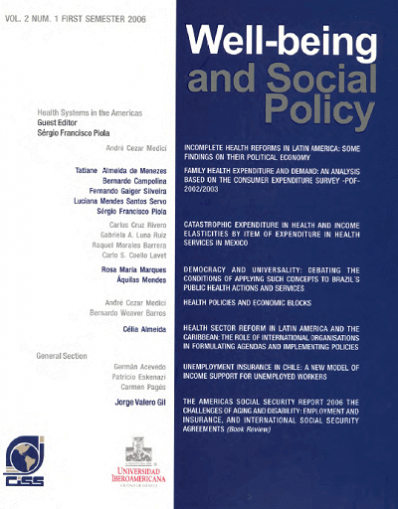
|
|
|
|

|
|
The Americas Social Security Report 2006 The challenges of aging and disability: employment and insurance, and international social security agreements (book review)
The 2006 Issue of the Report on Social Security in the Americas is divided in four chapters. The first two chapters address older-adult issues, the third chapter deals with disability-related problems, and the fourth chapter discusses Social Security agreements in the Americas. In the Presentation, it was pointed out that the objective of the Report on Social Security in the Americas is to become...
|
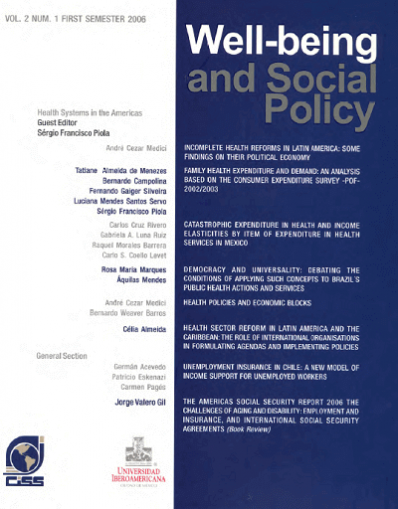
|
|
|
|

|
|
Book review. Beyond survival. Protecting households from health shocks in Latina America, by Baeza, Cristian C., y Truman G. Packard
The book by Cristian Baeza and Truman Packard is based on the next hypothesis: adverse health events reduce the consumption of goods and services different from health services, and many households become poor because of that. While the authors recognize that the evidence they present on the topic is limited, they propose the use of a “universal risk pool” as a way to eliminate the problem of...
|
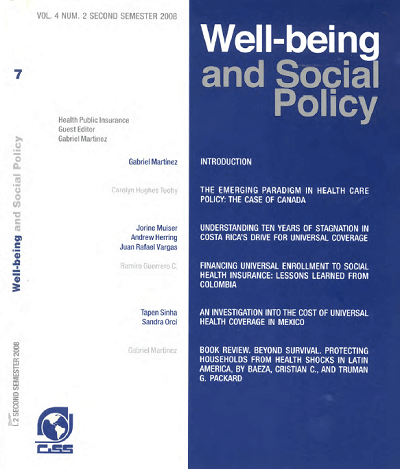
|
|
|
|

|
|
Impact of school quality on child labor and school attendance: the case of the CONAFE compensatory education program in Mexico
This paper focuses on the impact that two different types of policy interventions, namely enhancing school quality and contingent cash transfers, have on child labor and school attendance in Mexico. While there are many studies on the impact of Oportunidades on schooling outcomes, little evidence is available on whether school quality programs such as CONAFE also reduce child labor and help keep...
|
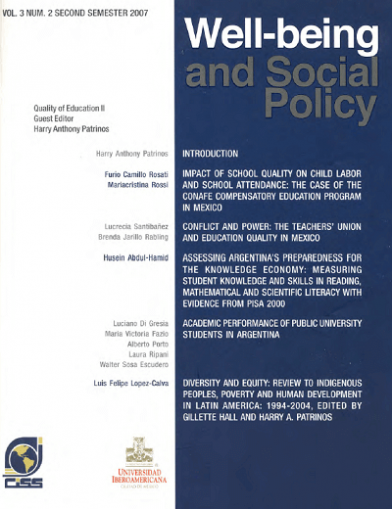
|
|
|
|

|
|
An investigation into the cost of universal health coverage in Mexico
The Mexican social security system, after operating for over six decades, has managed to provide healthcare for slightly over half the resident population.
There are wide geographical and socioeconomic variations in coverage. To provide wider coverage, the Federal Government created the Sistema de Protección Social en Salud (SPSS) for covering low income family. It becomes the third...
|
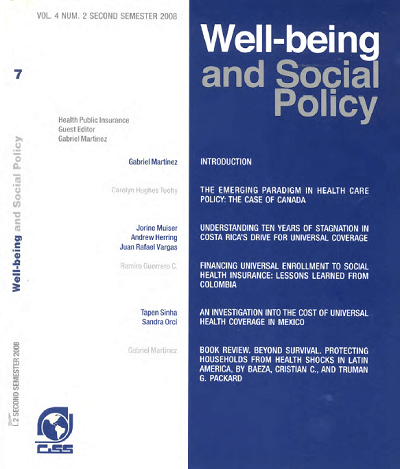
|
|
|
|

|
|
Financing universal enrollment to social health insurance: lessons learned from Colombia
The paper discusses the financing of the health care reform implemented in Colombia since the early nineties and explains the obstacles faced on the way to universal enrollment to social health insurance. The paper describes the reform and the sources created for its financing. It presents the observed trends in the financing of the insurance schemes created by the reform, identifies the...
|
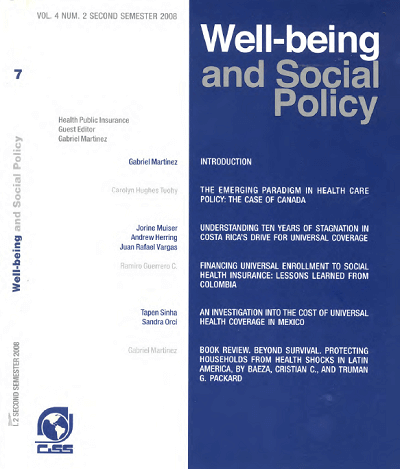
|
|
|
|

|
|
Understanding ten years of stagnation in Costa Rica's drive for universal coverage
This study analyzes achievements and obstacles in the process of moving towards universal coverage of essential health care services in Costa Rica. It describes the country as exemplary in the region, both in terms of population health status as well as health financing indicators. Life expectancy and the level of pre-payment are both comparable to high income countries. However, the process that...
|
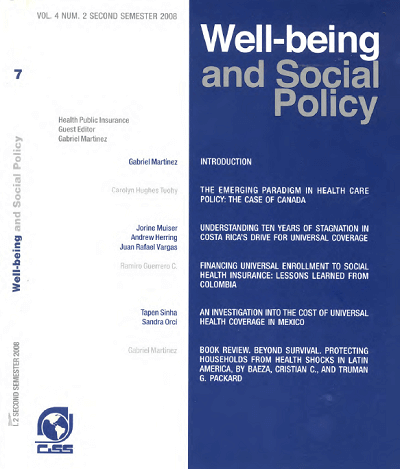
|
|
|
|

|
|
The emerging paradigm in heatlh care policy: the case of Canada
The model of health care financing and delivery for which Canada is best known internationally is its universal, single-payer, first-dollar system of coverage for physician and hospital services. For several decades following its establishment in the late 1950's and 1960's, this model provided public finance from the general tax base (like the UK), at levels of generosity, relative to GDP, like...
|
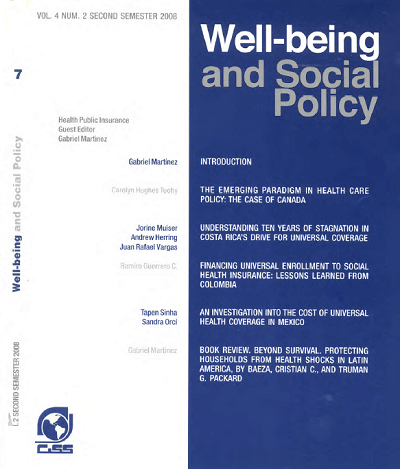
|
|
|
|

|
|
Introduction (on the subject that is addressed in the issue number)
In this issue of Well-being and Social Policy we have tried to include articles that support the debate around social insurance in health. This is an issue in which simple answers are hardly ever found, and a long term effort is required to understand the idiosyncrasy of each country and the best mix of regulation and financing options. Additionally, the studied cases point out to the need of a...
|
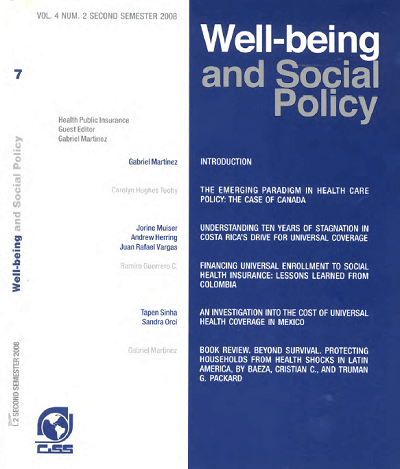
|
|
|
|

|
|
Book review. Public policy for an inclusive growth, edited by Pablo Cotler
The book “Public Policy for an Inclusive Growth” (The book) is an opportune and fortunate document. It is opportune because it is presented at a time in which public policy topics are subject to a wide debate in Mexico, and the discussion is fed with diverse points of view, theoretical and political, from which it is the purpose to analyze, design, redesign, implement, and evaluate the government...
|
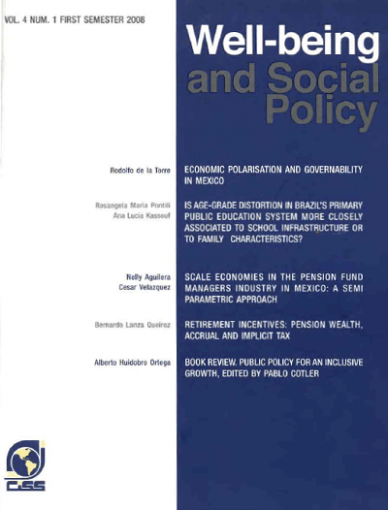
|
|
|
|

|
|
Retirement incentives: pension wealth, accrual and implicit tax
This paper estimates social security financial incentives for early retirement using contemporary techniques developed in economics, and compares these estimates to those estimated for developed countries. I find that implicit tax on continued work increases with age and amounts to over one-third of an individual potential earnings at age sixty-five. The pension replacement rate shows the degree...
|
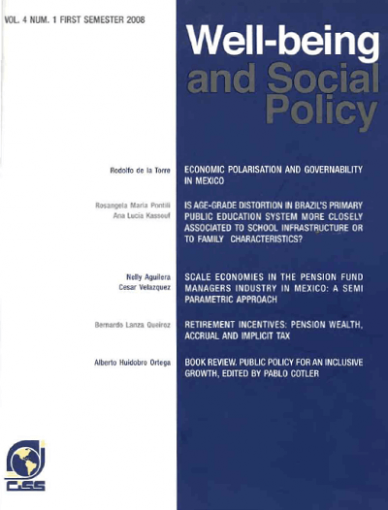
|
|
|
|

|
|
Scale economies in the pension fund managers industry in Mexico: a semi parametric approach
It has been widely accepted that reforms on pension schemes have led to improvements in the financial viability of the systems. Nevertheless, at the same time it has been shown that fees charged by pension fund managers (PFM) are very high, implying high mark-ups for them and lower expected pensions for the participants. The presence of economies of scale has been suggested as one main reason for...
|
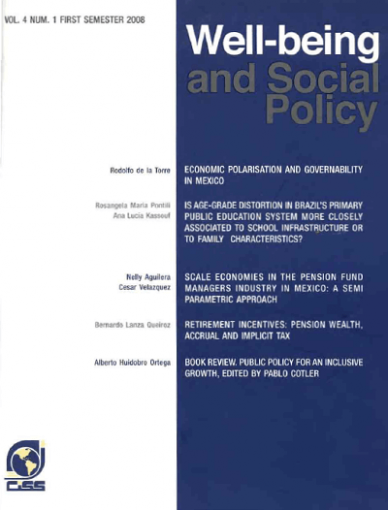
|
|
|
|

|
|
Is age-grade distortion in Brazil's primary public education system more closely associated to school infrastructure or to family characteristics
Different economic studies have shown the importance of education in improving the quality of life of individuals. Thus, in the 90’s, the public education system was reformed to enhance the quality of public education in Brazil and motivate student interest. This paper participated in this discussion by suggesting an assessment of the impact that school infrastructure and family characteristics...
|
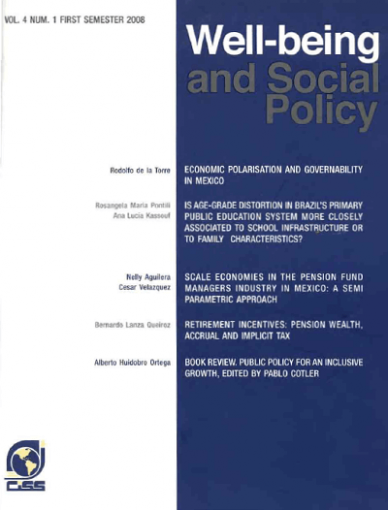
|
|
|
|

|
|
Economic polarisation and gobernality in México
The purpose of this essay is to appraise alternative hypothesis about the origins of recent social revolt in Mexico. It shows that it is not clear that a severe rise in poverty preceded the origins of violent conflict but social polarisation. Therefore, government attempts to deactivate the economic factors that led to social unrest did not necessarily upgrade povertyreduction policies. The...
|
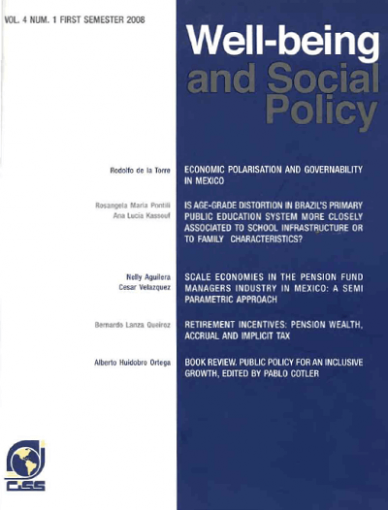
|
|
|
|

|
|
Diversity and equity: Review to indigenous peoples, poverty and human development in Latina America: 1994-2004, edited by Gillete Hall and Harry A. Patrinos
The evolution of specific welfare-related indicators for these indigenous populations during the last decade is the theme of this important book. The study declares to have four guiding questions,
to wit:
1. Have income poverty rates increased or decreased among Indigenous Peoples over the past decade, and what are the main determinants of observed trends?, How does this evolution compare to...
|
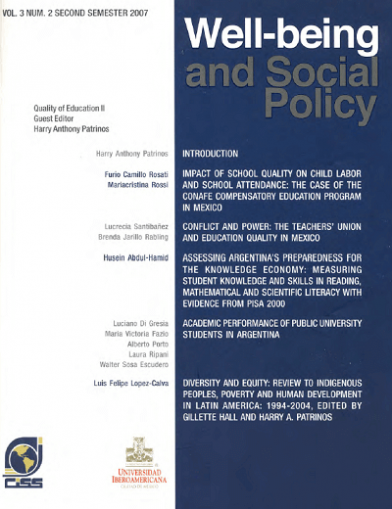
|
|
|
|

|
|
Academic performance of public university students in Argentina
Designing educational policies under limited budgets requires a thorough analysis of the impact of alternative factors on student performance. This work aims at providing an analysis of the relationship between university performance and its explanatory factors. The analysis Will focus on the Argentinean case, using the 1994 Census of Students in National Universities, which includes data on all...
|
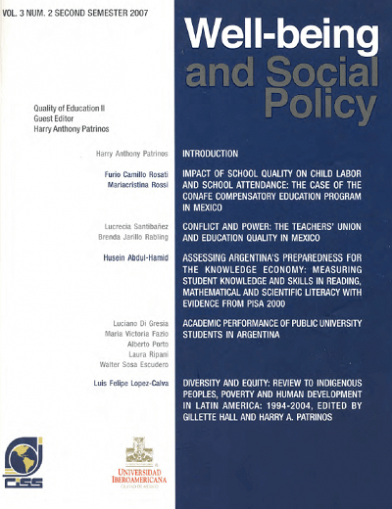
|
|
|
|

|
|
Assessing Argentina's preparedness for the knowledge economy: measuring student knowledge and skills in reading, mathematical and scientific literacy with evidence from PISA 2000
The results of 2000 study of the Programme for International Student Assessment (PISA) show that while Argentinean students performed similar to their peers in most other Latin American countries, they lagged behind all OECD and most of other participating countries. Attention needs to be given to further master the reading, math and science skills that are needed for a knowledge economy; and...
|
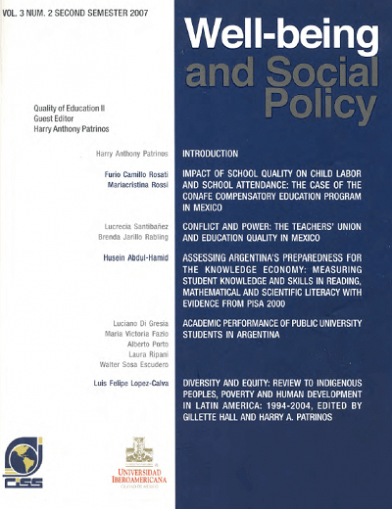
|
|
|
|

|
|
Conflict and power: the teachers' union and education quality in Mexico
The teachers union in Mexico, or Sindicato Nacional de Trabajadores de la Educación (SNTE) represents over 1 million members and is the largest in Latin America. This study uses data from the national student tests administered by the Instituto Nacional para la Evaluación de la Educación (INEE), along with data from the Mexican Ministry of Education and other sources, to investigate the...
|
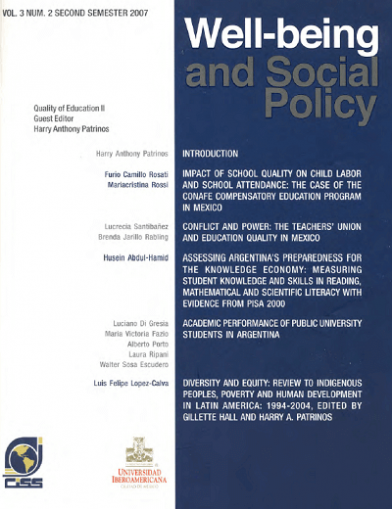
|
|
|
|

|
|
Introduction (about the internatinal conference on "The quality of education in Latin America and the Caribbean")
The Inter-American Conference on Social Security (CISS) and Universidad Iberoamericana (UIA) co-hosted an international conference on "The Quality of Education in Latin America and the Caribbean" in February 2007. The conference examined the quality of education in the region, the determinants of learning, policy and program evaluation, and the impact of quality of education on the labor market....
|
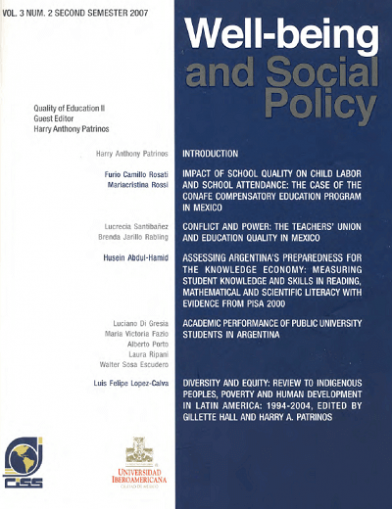
|
|
|
|

|
|
Introduction (about an international conference on "The effects of migration on sending countries")
The Inter-American Conference on Social Security (CISS) and Universidad Iberoamericana (UIA) co-hosted an international conference on “The Effects of Migration on Sending Countries” in February of 2006. The major objective of the conference was to examine a variety of channels through which migration affects the sending countries. Migrants change the dynamic of sending households; alter labor...
|
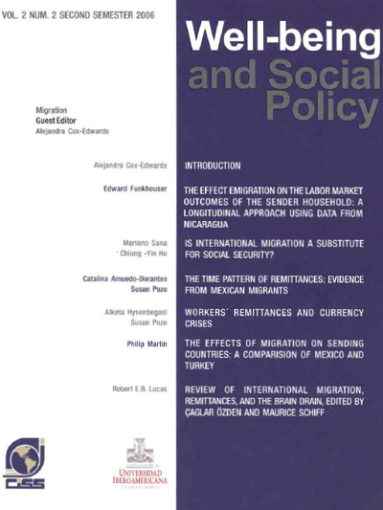
|
|
|
|
|